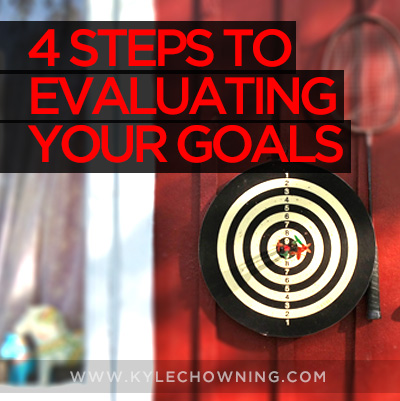“I want to be a C-level employee by the age of 40.” I said.
My boss looked at me and said: “Okay! Let’s see what we can do to get you there.”
At this point in my career, I was striving to grow in my job and responsibilities, but I didn’t really have a goal. While I was currently serving as the Vice President of Marketing, the organization I was working at was structured in a way that this position was still on the low end of the executive ladder. Ahead of me, I had Senior Vice President, Executive Vice President and then Chief Marketing Officer—the ultimate job. So I thought.
After I graduated from college, I had three goals in mind:
- Obtain a marketing job (I love marketing)
- Own my own business
- Get married
Honestly, I thought that these three goals were pretty big and that it would take around 5-10 years to accomplish them. Within two years, I had met all three goals.
Now what?
One can work an entire lifetime without goals and be just fine. You may know some of people like that; you may even be someone who fits that description. While that is, in and of itself a “goal”, if you want to achieve something great, it won’t cut it.
After achieving my college set goals, my main focus was to enjoy the work I was doing, make a good salary, have a respectable title and live the American dream. Sound great? Yeah, to me too.
On July 24, 2012, nearly three months after getting promoted to Senior Vice President of Marketing, I was sitting in a “7 Habits for Highly Effective People” refresher course and we began to review Habit #2: Begin with the End in Mind.
If you’ve never read the 7 Habits book, the gist of habit #2 is “…to start with a clear understanding of your destination. It means to know where you’re going so that you better understand where you are now and so that the steps you take are always in the right direction.” Author, Stephen R. Covey, goes on to say:
“People often find themselves achieving victories that are empty, successes that have come at the expense of things they suddenly realize were far more valuable to them.“
What was said for the rest of the day is completely a blur. I couldn’t help but wonder if I was set on achieving victories that were empty…at the expense of things…that were far more valuable to me?
Four Steps to Evaluating your Goals
Step 1: List your current goal(s)
Achieve a C-level position by the age of 40.
Step 2: Define your intentions and motivations for creating the goal(s)
I questioned “What does achieving a C-level title really meant to me?” Was it the title? Salary and benefits? Respect? Validation? What was really driving my desire to achieve this goal?
What I discovered in the process of asking these questions was that I was seeking validation. Being promoted to this level of leadership was a universal indicator that I was talented in the area of expertise I had set out to achieve in. While I believe that titles are good and helpful in the business world, I wondered if being promoted to Senior Vice President of Marketing had satisfied my desires? And it had.
Step 3: Define what success needs to look like
In order to get to the reason for my C-level goal, I had to dig much deeper into the heart of my career aspirations. I asked questions like:
- What am I really setting out to achieve in my career?
- What does success really need to look like?
- Is it a title?
- Is it a salary amount?
Enough questions were asked that day to get me to a place where I knew exactly what my next career goal was going to be.
Step 4: Redefine your Goals, if Needed
After I had asked all the questions, evaluated my intentions, it was time to redefine my goal, which was:
“To establish and grow one or more companies to benefit the long-term future of my family and the next generations.”
In that moment, my life and career focus became crystal clear. I was empowered with a goal by which I could measure every opportunity against.
I immediately asked myself, “Does your current job get you any closer to the goal you now have?” The answer was a clear, “no.”
The very next day, I got a call from the owner of a business in Franklin, Tennessee, that I had been casually talking to regarding the purchase of his business. And when I say casually, I mean that nothing could have felt further from a possibility. He informed me that “if we wanted to make an offer, we needed to do it fast.” An offer was coming in from another party and they wanted to close within weeks.
I had no funding. It seemed that the chances of this happening were non-existent. Four days later, I got a call that changed everything.
“The money is yours.” She said.
35 days after I redefined my goals, I closed on the purchase of the business. Somehow, and only by God’s favor, I found myself on the very path I had defined only weeks earlier. To be honest, I’m still in awe of how God orchestrated this story.
Goals are critically important to living an intentional life. Without knowing and understanding what’s important, you will find yourself achieving successes that are empty, at the sacrifice of what really matters to you.
Do you know why you’re doing what you’re doing?
<photo credit> Londonlooks </photo credit>

